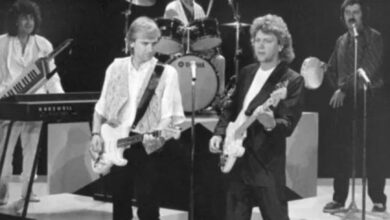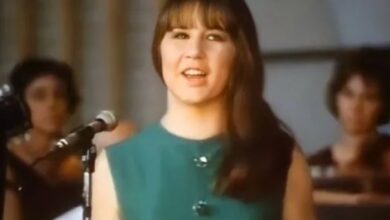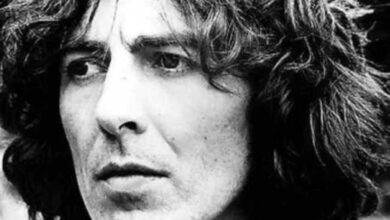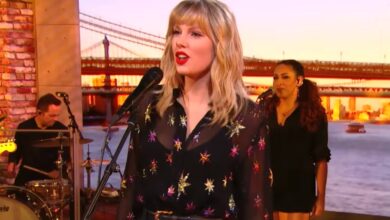Bee Gees’ “I Started a Joke” Captivates the World with Its Poignant Simplicity and Soul-Stirring Honesty (1968)
Released in 1968 as part of the Bee Gees’ album Idea, “I Started a Joke” swiftly became one of the group’s most emotionally resonant songs, earning its place among their most enduring classics. Though never released as a single in the UK, the track achieved massive success globally, particularly in the United States, where it peaked at number 6 on the Billboard Hot 100. With its introspective lyrics and haunting melody, it marked a shift in the Bee Gees’ songwriting, proving that their appeal extended far beyond pop harmonies and into the realm of deeply personal storytelling.
By the time “I Started a Joke” emerged, the Bee Gees were already on an upward trajectory, riding the wave of international acclaim that followed their 1967 breakthrough. Hailing from the Isle of Man and raised in Manchester before emigrating to Australia, the Gibb brothers—Barry, Robin, and Maurice—had honed their signature vocal blend from childhood. It was Robin’s distinct vibrato and melancholic tone that gave “I Started a Joke” its raw emotional core, setting it apart from their earlier hits and affirming the trio’s gift for musical vulnerability.
The inspiration behind the song has long been a topic of intrigue. Robin Gibb once mentioned that the idea came to him on an airplane, watching the sunrise through a window, evoking the sensation of a joke taken too far, a laugh misunderstood, and the subsequent isolation it causes. That emotional miscommunication is embedded in every lyric, suggesting a narrative of regret, loss, and unintended consequences. Unlike the abstract psychedelia of the late ’60s, this was a song grounded in universal human feeling.
Recorded at IBC Studios in London, “I Started a Joke” benefited from a sparse but effective arrangement. The production, helmed by Robert Stigwood and the Gibb brothers themselves, emphasized Robin’s haunting lead vocal, with Barry and Maurice providing harmonies that shimmered like afterthoughts of sorrow. The subtle use of Mellotron and orchestration gave the track a timeless, otherworldly feel, enhancing its meditative atmosphere without overwhelming the vocal performance that lay at its center.
The song’s reception was immediate and far-reaching. In addition to its Billboard success in the U.S., it reached number one in Canada, Brazil, and Australia. Radio stations played it endlessly, and listeners connected to its lyrics as a quiet anthem of sorrow. In a decade dominated by protest music and experimentation, “I Started a Joke” stood out for its stark simplicity—there were no political messages, just the pain of emotional fallout rendered in three aching minutes.
Culturally, the song broadened the Bee Gees’ image. No longer just creators of catchy pop, they were now recognized as poets of sadness, capable of capturing the internal landscapes of their listeners. It showed that vulnerability could sell records, and that heartbreak, when artfully articulated, could transcend trends. This song became a turning point, bridging pop and introspective balladry with profound impact.
For Robin Gibb, in particular, “I Started a Joke” became a defining moment. His uniquely sorrowful voice, often overshadowed by Barry’s falsetto in later years, was thrust into the spotlight. The song not only expanded the Bee Gees’ reach internationally but also solidified Robin’s place in the pantheon of great vocal interpreters. Concertgoers would request the song by name for decades, drawn to the way he could make melancholy sound beautiful.
The song’s influence extended far beyond the Bee Gees’ discography. It inspired generations of singer-songwriters to embrace emotional honesty, and its stripped-down, introspective style paved the way for other soul-searching ballads of the ’70s and ’80s. It wasn’t unusual for young artists to cite it as a formative influence, both musically and lyrically.
“I Started a Joke” has also been covered by a diverse range of artists, from Faith No More, who reimagined it in their 1995 compilation Who Cares a Lot?, to Robbie Williams and even The Wallflowers. Each rendition brings new emotional texture, yet all remain faithful to the melancholic essence of the original. These covers speak to the song’s elasticity—its ability to resonate across genres and generations.
Around the time of the song’s release, the Bee Gees faced their first serious creative tensions, particularly between Robin and Barry. Despite internal friction, the success of “I Started a Joke” served as a unifying force, reaffirming the potency of their collaborative magic even as individual identities began to assert themselves more strongly within the group.
In the decades since its release, the song has remained a staple of classic hits radio and retrospective compilations. It’s often cited as one of the Bee Gees’ most iconic recordings, not because it dazzles with production or innovation, but because it speaks so quietly and clearly to something all people experience: regret, misunderstanding, and the loneliness that can follow.
“I Started a Joke” also anticipated the band’s later reinventions. It demonstrated their capacity for change—how they could pivot from orchestral pop to disco, and later to soft rock balladry—while still retaining emotional authenticity. It laid the emotional groundwork for future triumphs, proving they were more than trend-chasers—they were storytellers.
Following Robin Gibb’s passing in 2012, the song took on new significance. Tributes poured in, many citing “I Started a Joke” as a symbol of Robin’s artistic legacy. It was performed at his memorial service, its lyrics now bearing the weight of real-world sorrow, as fans and loved ones mourned not just a musician, but a voice that had once spoken for the misunderstood.
Ultimately, “I Started a Joke” endures not just as a Bee Gees hit, but as a cultural touchstone. Its power lies in its humility, in its refusal to explain too much, and in its ability to make listeners feel seen in their quietest moments of doubt. It’s a ballad that doesn’t scream its message—it whispers, and that whisper continues to echo, generation after generation.





